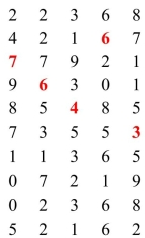Five students were scheduled to take a five-question true-false quiz on the history of the Peloponnesian War. Since they didn't know anything about the subject, they were faced with a decision of whether or not to study. Before they decided to study they decided to run a simulation to see how many of them would likely pass the quiz if they all just guessed randomly. At least three correct answers would be needed to pass. They made uf hypothetical set of correct answers as shown in the following table.
They then used the following random numbers table to ensure that the simulated response be truly random. Each simulated set of quiz responses began with a different highlighted from the table and included the four numbers beneath it. An odd number was said to corr an answer of True, and an even number was said to correspond to an answer of False. How many passing grades were there in the five simulated responses?
number pond to
A) 2
B) 4
C) 3
D) 1
Correct Answer:
Verified
Q43: The basic simulation technique using random numbers
Q44: Five-digit random numbers are used to
Q45: In many women's tennis matches they
Q46: In a free-throw relay, one member
Q47: A particular baseball player gets, on average,
Q49: Simulate ten coin tosses using the following
Q50: Simulation techniques go back to ancient times
Q51: List two advantages of using simulation techniques
Q52: The survey question "Do you feel that,
Q53: Why would researchers want to use a
Unlock this Answer For Free Now!
View this answer and more for free by performing one of the following actions

Scan the QR code to install the App and get 2 free unlocks

Unlock quizzes for free by uploading documents